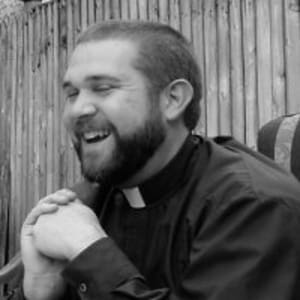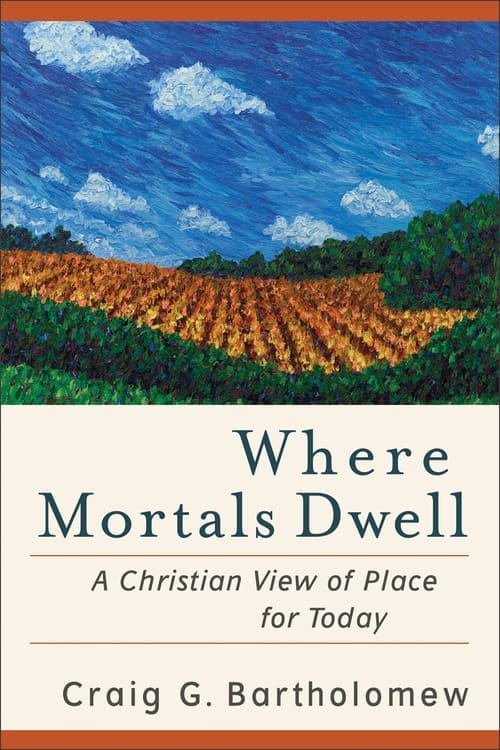Where Mortals Dwell: A Christian View of Place for Today by Craig G. Bartholomew. Baker Academic, 2011. 384pp.
The world is charged with the grandeur of God. It will flame out, like shining from shook foil.
—Gerard Manley Hopkins
Think of a place that has the most meaning for you. What is that place? What has it meant to you?
Castle Rock from shookfoil on Vimeo.
I think of Castle Rock, Washington, where we often gathered at my paternal grandfather’s estate when I was a child. This was a place of always-brooding grey sky, cool dampness, the smell of earth and must, wool, blackberry brambles from which we would fill buckets of berries in the summer to make pies, laughter, furtive rabbits, the impossible view of Mt. Rainier towering above the plaintive fields on a rare sunny day, and above all the warm and often penetrating intimacy of my extended family. The Galt property in Castle Rock was enchanted. I don’t know how to explain it other than to say it’s always seemed to be super-charged with meaning for me, then in experience and now in memory—a mystery to be explored.
Foremost in Castle Rock was the Umbrella Tree, a magnificent growth with fat, slick leaves overlapping to create an unbroken canopy. Slipping through the leaves you’d enter a spacious enclosure, for all the world like a circus tent. It might as well have been a secret entrance to Narnia. I remember also the little iron fence at the edge of the woods surrounding a single and fearsome unmarked tombstone: I can almost tremble still recalling the ghost I sensed in the bedroom window that faced the tiny grave in the dark as I tried to sleep. My gut can recall the late-edenic shame that gripped me when I snuck my grandmother’s thermometer for a plaything, dropped it on the kitchen floor, and watched as the glass shattered and the mercury ran unrecoverable down the channels of grout between the tiles like a watershed. And, though I cannot put the sensation into words, on a warm day under the sun with my eyes closed I am sometimes able to recover the feeling that morning when I rode home from church lying in the back seat of an old car in the flittering sun’s warmth, sharing with my grandmother the magnificent secret that I had for the first time been fed upon bread and wine I knew somehow to be magic. That place, that time, is maybe as close as I’ve come to feeling truly at home in this world.
What’s behind this mystery that some places, at some times, hold deep meaning, that some seem to mean more than others, and that we’re never quite able to capture or control the meaning of various places? If I could summarize into one the world of provocative answers given to the question of place in Craig Bartholomew’s recent Where Mortals Dwell; A Christian View of Place for Today (Baker Academic, 2011), it would be this: Every place has meaning . . . and some places mean more than others. And the point of discerning place’s meaning and the work of placemaking is that every place in this world might become more fully our home.
For we are displaced. Much of our experience of this world is marked by architectural blandness, urban destitution, strip-mall ennui, shrapnel in poppy fields, the cog-in-a-wheel cubicle, gulags, tenements, the home as consumer product, threatening wilderness, or simply what Walker Percy refers to as the malaise of an ordinary Wednesday afternoon. Too often we find ourselves fractured from place, alienated from home and with no sense that where we are has a modicum of meaning.
Where Mortals Dwell leaves none of these existential stones unturned, but rather digs them up, examines them, and shows how they may be re-implaced. For if the noonday devil of displacement is in the details, Bartholomew reminds us, so is Christ and the Holy Spirit. It is in the details of square inches, history, culture, and context that we discover and give new meaning to the places in which we live and move and have our being. Bartholomew sets forth the whole world as God’s home, and it’s fair to say that he explores nearly every nook and cranny, bringing forth from this storehouse treasures new and old. The exploration involves rigorous biblical-theological work, discourse with the history of philosophy, as well as theories of and challenges to contemporary placemaking. The discovery is a blueprint for the rehabilitation of God’s house, and the surprise that even the desk in front of you is a newfound treasure.
Each place partakes as we do of history, so its meaning grows or diminishes with time, becomes more rich or destitute, trends toward a concentration camp or a cathedral. Though we catch only fleeting glimpses of God’s glory flaming out in this world, if we are attentive to the nuance and import of place—in history—we will be better attuned to God’s efforts of redemptive place-making in this world. We will intuit how to tap into and conduct the charge of God’s grandeur, making each place radiate God’s glory.
The result may very well be a sort of re-enchantment of place. A thick notion and practice of placemaking will be earthy, yes, but also heaven-to-earthly. Placemakers will endue the ground under their feet, the walls around, the fields and the cities, with the blessing, story, and very life of God. Places will then take on a sacred resonance—a holy and palpable ripple, echo, or memory.
Take my kitchen table, for example. An unglamorous castaway we rescued from a Brooklyn curb has become my new battlefield for placemaking. Nearly every night we gather at this table as a Christian family eating dinner together. My children inevitably revert to wild play or unsettled arguments. But their mother and I hold fast most nights: we pray to give thanks, engage our children in conversation, force them to slow down to enjoy food, practice hospitality, sing, and read the Bible. I want our kitchen table to be ritualized as a place of God, family, and neighbour, that someday they may look up and say, “Surely the Lord is at this table and I didn’t know it . . . This is none other than the house of God.” In other words, I want my children and neighbours to be Christ-haunted by place in the similar aching way that I am Castle Rock-haunted—that we all might long for and seek re-implacement in the places we find ourselves.
I leave you with your cubicle, an affront to meaningful place if ever there was one. But even there, as with every square inch of this world, there is hope. I trust Craig Bartholomew will agree, and I commend to you Where Mortals Dwell as an inspiring and capable guide should you wish to discover that every place has meaning and desire to make each place mean more. If the Gates of Hell will not ultimately prevail against the advancing kingdom of God, then a potentially dehumanizing, man-made place such as a skyscraper cubicle seems a small foe indeed. Even if slums and prisons and parking lots will not survive the purifying fire that will usher in the new heavens and earth, for now might they not be made more holy by the sanctifying work of men and women embodying the presence and patterns of God as they faithfully go about their labours and play with thanksgiving?
It is in such efforts, engaged in each and every place, that the kingdom of this world is revealed as the very kingdom of our Lord and of his Christ. And each of us priests of our own little cubicle, preparing this world to become for us and for God truly and finally, home.


